In the last two years alone Prada, Gucci, Versace, Michael Kors, Jimmy Choo, DKNY, Burberry, Chanel and other high-profile brands have announced fur-free policies. In addition, online fashion retail giants Net-A-Porter and Farfetch have introduced no-fur policies.
The decision appears to have been introduced sometime after the company was bought out by Sports Direct owner Mike Ashley.
‘House of Fraser customers have made it clear they don’t want anything to do with the cruel fur trade, so it’s shocking that the retailer has ditched its long-standing fur-free policy, a move that’s out of touch with public and fashion industry opinion.
‘Its recent takeover by Sports Direct’s CEO Mike Ashley appears to have resulted in the retailer abandoning its morals and instead buying into the fur industry’s fantasy world of ‘responsibly sourced fur’.
‘The truth is there is no such thing; all fur is cruel, there is nothing responsible about foxes going mad in tiny wire battery cages, raccoon dogs being anally electrocuted, or coyotes being shot in leg-hold traps. We are urging House of Fraser shareholders to do the right thing for animals, and animal-loving customers, by reinstating its fur-free policy.’
CLAIRE BASS
UK executive director of Humane Society International
These UK fur imports are a double standard that the #FurFreeBritain campaigners are urging the government to end, by implementing a UK fur sales ban.
Where UK gets its fur
The UK banned fur farming almost two decades ago (in 2000) on ethical grounds, but since then has allowed imports of more than £820m worth of fur from overseas.
Since the ban the UK has imported more than £14m worth of fur from Finland, and HM Revenue and Customs figures also show sizeable imports from a range of other countries such as Italy, France, Poland, China and Russia.
So far in 2019, fur imports to the UK total £25.7m, including over £2.5m from China alone.
Finland is by far the biggest ‘producer’ of fox and raccoon dog fur in Europe, rearing and electrocuting around 2.5 million foxes every year for the global fur trade; only China farms more foxes globally.
Since the United Kingdom banned fur farming on ethical grounds in 2000, more than a dozen countries in Europe, including Austria, the Czech Republic, the Netherlands and Norway, have legislated against the practice.
In June this year the government in Ireland agreed to phase out fur farming and the Slovak National Council approved a ban on fur farming in October. Legislation to end the practice was presented to the Bulgarian parliament earlier this autumn.
Click here to read our article about the celebs backing a fur-free Britain.
 Play Video about This Rock Might Just Save The World
Play Video about This Rock Might Just Save The World Play Video about Play 2 hours of rock
Play Video about Play 2 hours of rock Play Video about Play 2 hours of brook
Play Video about Play 2 hours of brook Play Video about Play 2 hours of sheep
Play Video about Play 2 hours of sheep











































